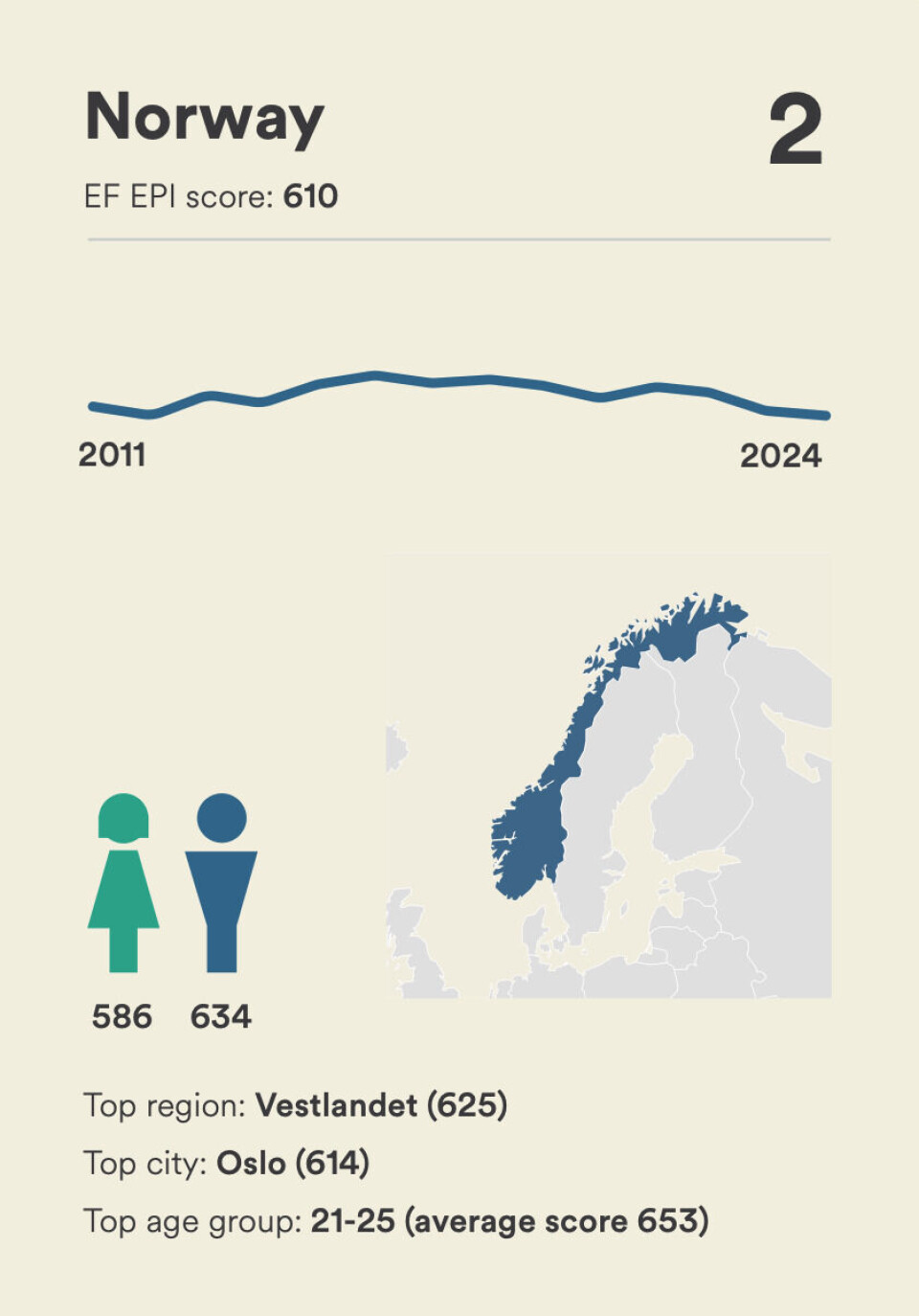Norwegians are the second-best in the world when it comes to learning English
"I'm not convinced that this is solely due to Norwegian schools," says an English professor.

Among non-English-speaking countries, only the Netherlands outperformed Norwegians in English last year, according to the world's largest language test with over two million participants.
Norway ranked slightly ahead of Singapore, Sweden, Croatia, Portugal, Denmark, and Greece.
In the EF EPI (English Proficiency Index) language test, Oslo ranked 5th among cities worldwide in English proficiency. Amsterdam took first place.
Not because of school
"It's interesting that we even rank ahead of, for example, Singapore, where English is an official language," says Glenn Ole Hellekjær.
He is professor emeritus of English at the University of Oslo.
"But I'm not convinced that this is solely due to English education in Norwegian schools. A significant reason is likely all the English that young Norwegians, in particular, are exposed to daily," he says.
Hellekjær references a PhD thesis by Lisbeth Brevik at the University of Oslo, which found that boys in vocational programmes who game a lot are significantly better at reading English than Norwegian.
Could become a crutch
"English as a school subject benefits enormously from the widespread exposure to the language outside of the classroom," says Hellekjær.
"This stands in stark contrast to language subjects like German and French," he says.

The English professor questions whether Norwegian schools are doing enough to recognise and build upon the strong – mostly oral – English skills that many young people possess.
"We also see that fewer and fewer adolescents choose advanced English courses in upper secondary school," he says.
"I fear that the solid knowledge many have in everyday English may become a crutch. This level of knowledge is insufficient if, for example, you are hired as a specialist in an international company. In that case, you need professionally relevant language skills at a much higher level," he says.
Strong English proficiency in Eastern Europe
In the EF EPI language test, countries in the Middle East and Africa performed the worst.
In Europe, France and Italy stand out as countries with weak English proficiency, while Spain fares slightly better.
Eastern European countries, on the other hand, perform well in the EF EPI language test. The best English skills are found among those who took the test in Romania and Poland, followed closely by Bulgaria, Hungary, Slovakia, and Estonia.
Declining global English proficiency
The international language school EF is behind the study.
Every year since 2011, the language school has compiled its test results – this year from 116 countries. In each of these countries, at least 400 people took the test.
According to the EF EPI test, global English proficiency is steadily declining.
For the fourth consecutive year, the test has shown worse global results than the year before. Although the changes from year to year are small, EF points out in its analysis that the trend is clear.
It is particularly men's English skills worldwide that are declining.
There is also a significant gender gap, with men demonstrating notably stronger English skills than women in many countries.
The EF EPI test shows that this gender gap is especially large among younger individuals but narrows with age. The most significant gender gap is found in Latin America, as well as in countries like Kyrgyzstan and Afghanistan.
Best results in Western Norway
In Norway, people in Western Norway achieve the highest scores on the English test.
The results for Norway show a clear trend: the younger the participant, the better their English proficiency. The highest scores come from participants aged 21-25.
Over the past two years, Norwegian women have scored significantly lower on the English test.
For Norwegian men, test results have remained stable.
Written English poses a greater challenge
When sciencenorway.no asked Øystein Hegglund, associate professor of English at the University of South-Eastern Norway, about the EF EPI test results last year, he pointed to a similar issue as Hellekjær: That written English is a greater challenge for many Norwegians than spoken English.
The EF Education language school was founded in 1965 by Swedish Bertil Hult, who started sending Swedes to language school in the UK. Bertil, who was dyslexic, had not learned English in school. His idea was that people improve their English when they are forced to speak the language with others – just as he had to when he got a job in the UK.
———
Translated by Alette Bjordal Gjellesvik
Read the Norwegian version of this article on forskning.no
References:
Brevik, L.M. How teachers teach and readers read. Developing reading comprehension in English in Norwegian upper secondary school, PhD thesis at the University of Oslo, 2015.
Brevik, L.M. & Hellekjær, G.O. Outliers: Upper secondary school students who read better in the L2 than in L1, International Journal of Educational Research, vol. 89, 2017. DOI: 10.1016/j.ijer.2017.10.001
EF EPI: EF English Proficiency Index - A Ranking of 116 Countries and Regions by English Skills, 2024.
Related content:

Subscribe to our newsletter
The latest news from Science Norway, sent twice a week and completely free.





































